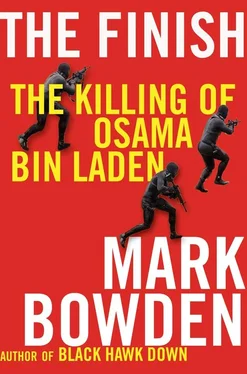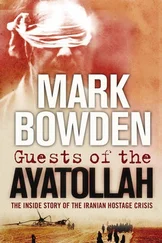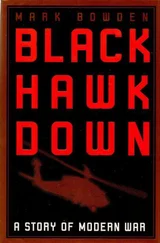Whoever did this, it was not likely to be a nation-state. It was probably a small group of dedicated fanatics working out of a variety of places that were hard to find and hard to reach. War always poses new challenges. A nation, stirred to action by a novel threat, has to feel its way in, has to invent the strategy and tactics that will prevail. It would take time—in this case most of a decade—but McRaven was uniquely positioned to see where it would end. He had made a study of Special Operations. He was already convinced—the first inklings were beginning to appear on TV—that this had been the work of a small terrorist group that called itself al Qaeda . Men like McRaven had heard a lot more about al Qaeda than most of the country. If not that group, then one like it. How would you fight a stealthy, stateless organization that plotted sneak attacks? You fought it with intelligence and with highly trained special units like his SEALs, men who could strike with speed and precision anywhere in the world. He could see it clearly. His squadron would be going to war without him.
But better than most, he also knew this war was going to take time. With time he would heal. With time there might just be a way for him to work himself back into it.
In Washington, Michèle Flournoy saw the smoke rising from the Pentagon across the Potomac River. She had a lot of friends who worked there.
A Harvard- and Oxford-educated scholar, she was, at forty, an influential thinker in defense circles, and one of the few women in Washington who had made national security her career. Everyone who knew her knew that it was only a matter of time before she would assume another top-level position at the Pentagon, but for now, as with many who owed their government jobs to the ascendance of one political party or the other, her background as a senior Pentagon planner during the Clinton administration meant that she was one of many policy experts who were effectively in exile during the first White House term of a Republican administration.
Flournoy was known for advocating an internationalist approach to national defense, one based more on partnerships and pragmatism than ideology. President Bush had filled many of the defense-related posts in his administration with those more inclined to use American military power unilaterally, to seek international partners but not to be bound by them. With the nation at peace, these philosophical differences were primarily of interest to subject matter experts and played out in forums related to military planning and development. Earlier that morning Flournoy had been interviewed on National Public Radio about some of the initiatives planned by Defense Secretary Donald Rumsfeld. She was working for the Center for Strategic and International Studies (CSIS), a bipartisan think tank, and was a professor at the National Defense University, helping the Pentagon prepare its Quadrennial Defense Review, a broad strategic plan for the massive department that afforded the most practical outline for national defense priorities. When the planes started to hit, she was attending a defense forecasts international briefing in a building across the street from the White House.
All of the buildings in the vicinity were evacuated. As she stood on Pennsylvania Avenue eyeing the ominous smoke column from across the river, she knew whatever they had been discussing at that briefing was suddenly moot, as if someone had taken an eraser to the whole board. America’s defense priorities were being radically and violently reset.
She walked a few blocks to the CSIS’s offices, called home to check on her children, and then began trying to get through to friends at the Pentagon on the phone, without success. So she took some calls from colleagues and from reporters, including the reporter from NPR she had just spoken with hours earlier. She shared the growing suspicion that the attacks were the work of al Qaeda, but at that point it was just a hypothesis.
Another Democrat in exile, Thomas Donilon, was also in downtown D.C., undergoing his annual physical in a suite on M Street. He was forty-six, an age when years of long hours sitting behind a desk begin to take their toll, especially for a big man like him. A lawyer with a long background in government, he was known for doing the work of three and had the slackening frame to show for it. In a world capital of the work-addicted, he was considered exceptional. Donilon had been the youngest aide on the staff of President Jimmy Carter in 1977 and had served as chief of staff for the State Department during the Clinton administration. He had joined the Clinton campaign in 1992 as a stand-in for President G. H. W. Bush and for Ross Perot in debate preparation. Hours of prep armed him with telling facts and examples. He was tenacious: unfailingly pleasant but tough. He had a way of displaying his teeth as he spoke, top and bottom, so that the words seemed chewed. Clinton liked to spar with him verbally before a big match. Now, less than a year into the new Republican administration, he was getting used to life as an outlier, putting his law degree and experience inside government to work as a lobbyist for Fannie Mae.
When his doctor was finished with him, he drove his car from the garage under the building and into gridlock. Office buildings throughout the District had emptied. It seemed as if the entire government workforce was making its way home. Donilon tried to call his wife, but cell phone service was so overwhelmed that his call could not go through. He turned on the radio and listened in horror as he inched his way northeast toward home. The drive took a long time. When he got there he found that his wife had also come home from work, after picking up their daughter early from her Bethesda preschool. They turned on the TV and watched with the rest of the country.
Michael Vickers was just a few blocks away at his own small think tank offices, the Center for Strategic and Budgetary Assessments. He had founded it after leaving intelligence and military work. Twenty years earlier, as a brainy CIA officer, he had put together the clandestine U.S. mission to help a loosely connected group of tribal leaders and Islamist extremists fight the Soviet Union in Afghanistan, an effort that was considered the largest covert mission in the intelligence agency’s history. The former army special forces officer was legendary in his own world. He was an expert in the Near East, had extensive contacts in that region, and with a career that had straddled intelligence and special ops would prove to be uniquely credentialed for this new war. The next day he would be back at work at the Pentagon as a consultant, summoned by Rumsfeld to help figure out how the United States should respond.
In Bosnia, Brigadier General David Petraeus was at a Nordic-Polish brigade headquarters in the early evening when the news came. A small and wiry man who walked with a slight stoop from his own jump accident years earlier, he sat with a group of international officers watching as the towers collapsed and realized that his mission, and that of every American soldier, was about to change. His suspicions immediately fell to al Qaeda and its founder, a man named Osama bin Laden.
This was no wild guess. Petraeus had been executive officer for the Joint Chiefs of Staff at the Pentagon from 1997–1999, during the period when the Clinton administration frequently debated whether and how to go after the radical Islamist leader. The decisions then had been to launch cruise missiles at al Qaeda targets in the Sudan and Afghanistan, a noisy gesture that hadn’t accomplished much. Bin Laden was slippery. The response now would be a lot bigger—world changing. One of Petraeus’s jobs in Bosnia was commanding a clandestine joint task force, one made up of elite representatives from all the service branches, that had been finding and targeting fugitive Serbian and Croatian war criminals, gathering intelligence, and then swooping in on targets swiftly, often from helicopters at night.
Читать дальше












